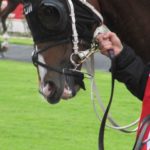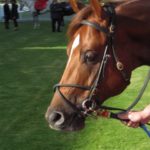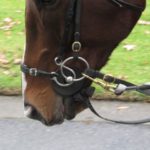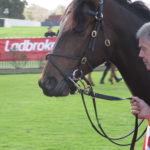Sandown Park
May 28th, 2016Did you see Professor Paul McGreevy on the ABC News the other day, getting stuck into the use of restrictive nosebands on equestrian horses at this year’s Rio Olympics? The crank noseband has a leveraged buckle design that can be tightly adjusted to clamp the jaws together. It is mainly used on dressage horses that refuse to keep their mouths shut. In a new study at Sydney University Paul and his team found that a tight noseband elicited an elevated heart rate and increased eye temperature, indicators of a physiological stress response. And the tight noseband also prevented the expression of various oral behaviours, such as chewing, licking and swallowing. The study has been published online in Plos One.
I have long been averse to gear on a horse’s head, including noserolls and nosebands. Crank nosebands aren’t used on racehorses, but the cross-over noseband is relatively common. There were nine cross-over nosebands at Sandown today and one Kineton noseband. None of the ten horses were placed!
- Caprese
- Four Carat
- Mr Individual
- Stand To Gain
- Tan Tat Charger
- Temps Voleur
The Kineton noseband on Stand To Gain is easily distinguished from a conventional noseband by the half rings on each side, their J-like shape, and the low position of the band on the nose. You can find more discussion about them in Watching More. They are petty rare and I haven’t seen enough to give them a behavioural handicap, although of course I think they are worth opposing in the betting. The cross-over noseband however has a definite negative effect on performance with a current behavioural handicap of 18. This simply means that horses win 18 per cent less than expected by chance.
If you look carefully at the six horses in the photographs you will notice a lot of variation in design (Tip: click on the photo then click again to enlarge it). Some bands seem more benign than other, such as the rolled leather on Mr Individual and Tan Tat Charger. Others seem more heavy duty such as the one on Temps Voleur and others attempt to mitigate the impact of the band on the bridge of the nose with a woollen or plastic pad such as on Caprese and Four Carat. I oppose horses with a cross-over noseband, with one notable exception. I backed the champion horse So You Think when he showed me that it was just an irrelevant piece of gear!
The change in weather at Sandown today, from Indian summer to winter, has reminded me that it is time for a break. Time to fly north to Queensland and warm up my body. Look out for a postcard from the spelling paddock. See you in the spring!








